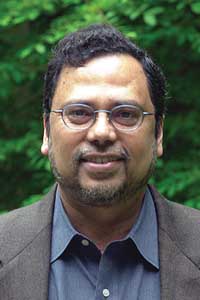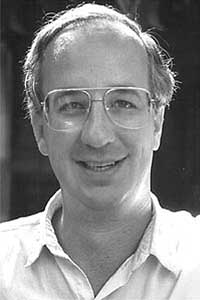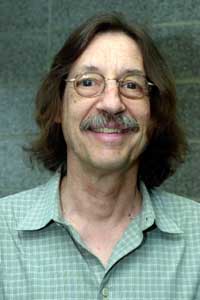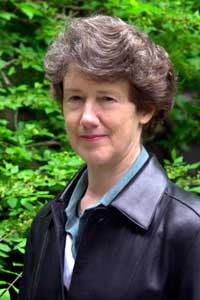National academies elect four Chicago scholars
By William Harms, Steve Koppes, and Seth SandersNews Office
 Dipesh Chakrabarty | |
 Jeffrey Harvey | |
 William Sewell | |
 Nancy Stokey | |
The American Academy of Arts and Sciences and the National Academy of Sciences have elected to their memberships four University faculty members.
The American Academy of Arts and Sciences, founded in 1780 by John Adams, James Bowdoin, John Hancock and other scholar-patriots, has elected three University professors as 2004 fellows.
They are Dipesh Chakrabarty, Jeffrey Harvey and William Sewell.
The fellows are elected to five classes: mathematics and physical sciences, biological sciences, social sciences, humanities and the arts, and public affairs, business and administration. American Academy of Arts and Sciences fellows conduct interdisciplinary studies in a broad range of disciplines.
Dipesh Chakrabarty is the Lawrence A. Kimpton Distinguished Service Professor in South Asian Languages & Civilizations and the College. His research interests are modern South Asian history and historiography, postcolonial theory and its impact on history-writing, and comparative studies of the politics of modernity.
He is currently working on a book on the impact of democracy on the discipline of history, and another on literature and history in colonial Bengal. His latest book is Habitations of Modernity: Essays in the Wake of Subaltern Studies (University Press).
A founding member of the journal Subaltern Studies, co-editor of Critical Inquiry and a founding editor of the journal Postcolonial Studies, Chakrabarty also has served on the editorial committee of Public Culture and the American Historical Review.
His books include Provincializing Europe: Postcolonial Thought and Historical Difference and Rethinking Working-Class History: Bengal, 1890-1940. A volume of his Bengali-language essays, titled Itihash: torke-bitorke (Arguing About History), has been contracted to be published by Ananda Publishers, Calcutta, India.
After studying physics as an undergraduate at Calcutta University and graduating from the Indian Institute of Management in Calcutta, Chakrabarty went on to earn a Ph.D. in history from Australian National University in 1984. He taught at the University of Melbourne before joining the Chicago faculty in 1995.
Jeffrey Harvey is the Enrico Fermi Distinguished Service Professor and Chairman of the Physics Department. He specializes in particle physics, cosmology and string theory, the focus of his current research. Strings are hypothetical objects that help explain how the four fundamental forces of nature—gravitation, electromagnetism, and the strong and weak nuclear forces—fit together.
Harvey was appointed a Professor in Physics at Chicago in 1990. Previously he had been a faculty member at Princeton University. He has been the recipient of an Alfred P. Sloan Fellowship and a National Science Foundation Presidential Young Investigator award. He also is an elected fellow of the American Physical Society.
He is the co-editor of four books: String Theory and Quantum Gravity ’91, String Theory and Quantum Gravity ’92, Recent Directions in Particle Theory, from Superstrings and Black Holes to the Standard Model, and Strings, Branes and Gravity.
Harvey received his B.Sc. in physics and mathematics from the University of Minnesota with Phi Beta Kappa honors and his Ph.D. in physics from the California Institute of Technology.
William Sewell is the Max Palevsky Professor in Political Science, History and the College and Director of the Center for the Study of Politics, History and Culture.
An expert on 18th- and 19th-century French history, he is the author of Work and Revolution in France: The Language of Labor From the Old Regime to 1848 (1980), which has been translated into French, Italian and Spanish. His work includes two other books, Structure and Mobility: The Men and Women of Marseille (1985) and A Rhetoric of Bourgeois Revolution: The Abbe Sieyes and What Is the Third Estate? (1994). He also works on the relations between history and social theory. Sewell’s new book, Logics of History: Social Theory and Social Transformation, will be published next year by the University Press.
Sewell was a University faculty member in History from 1968 to 1975 and rejoined the Chicago faculty in 1990 as Professor in Political Science and History.
He spent the intervening years at the Institute for Advanced Study, the University of Arizona and the University of Michigan. He received his B.A. in 1962 from the University of Wisconsin and his Ph.D. in 1971 from the University of California, Berkeley.
Nancy Stokey is among 72 new members elected to the National Academy of Sciences in recognition of their distinguished and continuing achievements in original research.
The National Academy of Sciences, a private organization of scientists and engineers, which serves as an official advisory body to the federal government in matters of science and technology, was established by Congress in 1863. Election to membership in the NAS is considered one of the highest honors accorded a U.S. scientist or engineer.
Stokey, an expert on economic growth and development, is the Frederick Henry Prince Professor in Economics and the College. She is the author of numerous papers on economic growth as well as co-author of Recursive Methods in Economic Dynamics (1989), a book about the research methods economists use in their work.
She also was selected to be part of the Copenhagen Consensus, a gathering in Copenhagen where some of the world’s leading economists gather to rank the biggest challenges of the world. The roundtable is co-sponsored by The Economist and the Danish National Environmental Assessment Institute. Another University participant is Robert Fogel, the Charles R. Walgreen Distinguished Service Professor of American Institutions in the Graduate School of Business.
Stokey is an editor of the Journal of Political Economy, and in the past has served as co-editor of Econometrica, associate editor of Games and Economic Behavior, and associate editor of the Journal of Economic Theory. She was vice president of the American Economic Association from 1996 to 1997.
She joined the University faculty in 1990 after serving on the faculty at Northwestern University, where she was the Harold Stuart professor of managerial sciences. She received a B.A. in economics from Pennsylvania State University in 1972 and a Ph.D. in economics from Harvard University in 1978.
![[Chronicle]](/images/sidebar_header_oct06.gif)